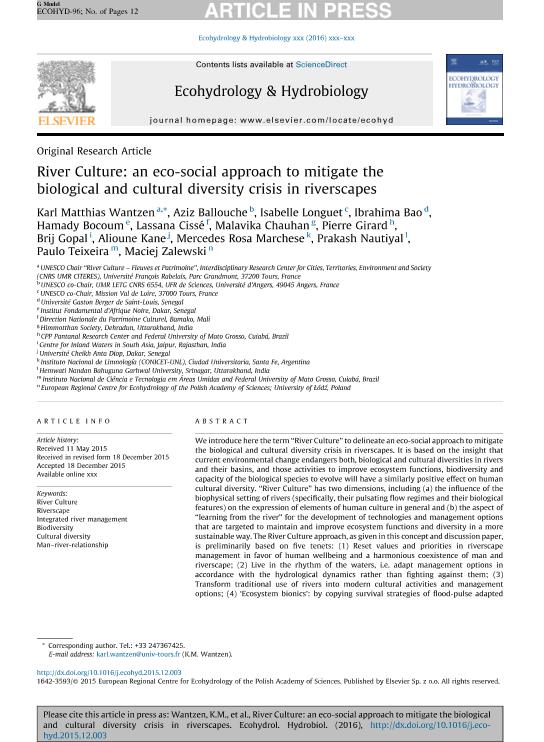Mostrar el registro sencillo del ítem
dc.contributor.author
Wantzen, Karl Matthias
dc.contributor.author
Ballouche, Aziz
dc.contributor.author
Longuet, Isabelle
dc.contributor.author
Bao, Ibrahima
dc.contributor.author
Bocoum, Hamady
dc.contributor.author
Cissé, Lassana
dc.contributor.author
Chauhan, Malavika
dc.contributor.author
Girard, Pierre
dc.contributor.author
Gopal, Brij
dc.contributor.author
Kane, Alioune
dc.contributor.author
Marchese Garello, Mercedes Rosa

dc.contributor.author
Nautiyal, Prakash
dc.contributor.author
Teixeira, Paulo
dc.contributor.author
Zalewski, MacIej
dc.date.available
2018-09-18T13:20:30Z
dc.date.issued
2016-02
dc.identifier.citation
Wantzen, Karl Matthias; Ballouche, Aziz; Longuet, Isabelle; Bao, Ibrahima; Bocoum, Hamady; et al.; River Culture: An eco-social approach to mitigate the biological and cultural diversity crisis in riverscapes; Elsevier Science; Ecohydrology and Hydrobiology; 16; 1; 2-2016; 7-18
dc.identifier.issn
2080-3397
dc.identifier.uri
http://hdl.handle.net/11336/60052
dc.description.abstract
We introduce here the term "River Culture" to delineate an eco-social approach to mitigate the biological and cultural diversity crisis in riverscapes. It is based on the insight that current environmental change endangers both, biological and cultural diversities in rivers and their basins, and those activities to improve ecosystem functions, biodiversity and capacity of the biological species to evolve will have a similarly positive effect on human cultural diversity. "River Culture" has two dimensions, including (a) the influence of the biophysical setting of rivers (specifically, their pulsating flow regimes and their biological features) on the expression of elements of human culture in general and (b) the aspect of "learning from the river" for the development of technologies and management options that are targeted to maintain and improve ecosystem functions and diversity in a more sustainable way. The River Culture approach, as given in this concept and discussion paper, is preliminarily based on five tenets: (1) Reset values and priorities in riverscape management in favor of human wellbeing and a harmonious coexistence of man and riverscape; (2) Live in the rhythm of the waters, i.e. adapt management options in accordance with the hydrological dynamics rather than fighting against them; (3) Transform traditional use of rivers into modern cultural activities and management options; (4) 'Ecosystem bionics': by copying survival strategies of flood-pulse adapted organisms novel forms of human use can be developed; (5) Make the catchment (river basin) the geographical base unit for all kinds of political decisions in landscape management.
dc.format
application/pdf
dc.language.iso
eng
dc.publisher
Elsevier Science

dc.rights
info:eu-repo/semantics/openAccess
dc.rights.uri
https://creativecommons.org/licenses/by-nc-sa/2.5/ar/
dc.subject
Biodiversity
dc.subject
Cultural Diversity
dc.subject
Integrated River Management
dc.subject
Man-River-Relationship
dc.subject
River Culture
dc.subject
Riverscape
dc.subject.classification
Meteorología y Ciencias Atmosféricas

dc.subject.classification
Ciencias de la Tierra y relacionadas con el Medio Ambiente

dc.subject.classification
CIENCIAS NATURALES Y EXACTAS

dc.subject.classification
Otras Ciencias Biológicas

dc.subject.classification
Ciencias Biológicas

dc.subject.classification
CIENCIAS NATURALES Y EXACTAS

dc.title
River Culture: An eco-social approach to mitigate the biological and cultural diversity crisis in riverscapes
dc.type
info:eu-repo/semantics/article
dc.type
info:ar-repo/semantics/artículo
dc.type
info:eu-repo/semantics/publishedVersion
dc.date.updated
2018-09-14T14:27:00Z
dc.journal.volume
16
dc.journal.number
1
dc.journal.pagination
7-18
dc.journal.pais
Polonia

dc.description.fil
Fil: Wantzen, Karl Matthias. Universite de Tours; Francia
dc.description.fil
Fil: Ballouche, Aziz. Universite D'angers; Francia
dc.description.fil
Fil: Longuet, Isabelle. Unesco; Francia
dc.description.fil
Fil: Bao, Ibrahima. Universite Gaston Berger de Saint-louis; Senegal
dc.description.fil
Fil: Bocoum, Hamady. Institut Fondamental D'afrique Noire; Senegal
dc.description.fil
Fil: Cissé, Lassana. Direction Nationale Du Patrimoine Culturel; Malí
dc.description.fil
Fil: Chauhan, Malavika. Himmotthan Society; India
dc.description.fil
Fil: Girard, Pierre. Universidade Federal de Mato Grosso; Brasil
dc.description.fil
Fil: Gopal, Brij. Centre For Inland Waters In South Asia; India
dc.description.fil
Fil: Kane, Alioune. Universite Cheikh Anta Diop; Senegal
dc.description.fil
Fil: Marchese Garello, Mercedes Rosa. Consejo Nacional de Investigaciones Científicas y Técnicas. Centro Científico Tecnológico Conicet - Santa Fe. Instituto Nacional de Limnología. Universidad Nacional del Litoral. Instituto Nacional de Limnología; Argentina
dc.description.fil
Fil: Nautiyal, Prakash. Hemwati Nandan Bahuguna Garhwal University; India
dc.description.fil
Fil: Teixeira, Paulo. Universidade Federal de Mato Grosso; Brasil
dc.description.fil
Fil: Zalewski, MacIej. University Of Lodz; Polonia
dc.journal.title
Ecohydrology and Hydrobiology
dc.relation.alternativeid
info:eu-repo/semantics/altIdentifier/doi/https://dx.doi.org/10.1016/j.ecohyd.2015.12.003
dc.relation.alternativeid
info:eu-repo/semantics/altIdentifier/url/https://www.sciencedirect.com/science/article/pii/S1642359315000762
Archivos asociados
